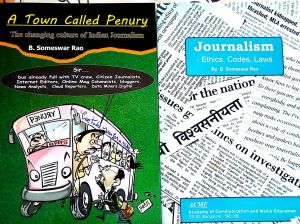Hooked on from childhood
“Why write?”, they question, “No one reads. Who has the time? Facebook and WhatsApp have killed reading.”
 That was from my blog post (Tomorrow becomes Today, Dec20, 2016). So get used to writing without expecting anyone to read. I still write, though almost no one reads.
That was from my blog post (Tomorrow becomes Today, Dec20, 2016). So get used to writing without expecting anyone to read. I still write, though almost no one reads.
But when I wrote that, a friend responded that in my decades as a journalist I must have realised that writing was like throwing a stone at random – it may hit someone somewhere.
One of the reasons why no one has time to read (post ‘Where Is The time?‘ Jan.13) is their being too busy with communication tools like Facebook and WhatsApp to communicate! In helping communication between people they – and such others – have resulted in people not meeting each other face to face for long, relying only on these apps to ‘stay in touch’.
Seeing people on mobile phones in buses and trains, driving on roads, walking or while cooking or doing other work, I wonder how they communicated before mobile phones became so common. They could do without talking, waiting till they reached a landline phone and till they were certain that the contacted person was also near a telephone. Rarely had this caused a catastrophe. No one may have died on that account.
Now they talk simply because the means to do so was available, perhaps also to avoid a face-to-face talk. People send long messages on WhatsApp to persons in the adjacent room. There are many who live in the same house but talk briefly only on mobile phones.
Just as e-mail has killed letter writing, Facebook, WhatsApp, Duo, Snapchat and similar apps resulted in people losing human touch – not meeting each other for long. With every intelligent person studying only for engineering, medicine and financial services, few go for sociology or anthropology and so the cultural impact of these developments is not studied.
We just allow technology to dictate our lifestyles. There are dangerous consequences. The following story (received, of course, on WhatsApp) tells how:
A guy sends you a friend request. You don’t know him, but he’s got a cute profile picture, so you accept his friend request.
It’s your baby girl’s first day of school. She looks SO cute in her new outfit you just have to take a picture and put it on Facebook so all your friends and family can see.
You’re so excited dropping her off that you ‘Check in’ to her school on FB saying
‘I can’t believe how big she’s gotten. Time sure flies. One proud momma/daddy right here’.
Meanwhile, the mystery guy whose friend request you hurriedly accepted earlier this morning is saving that picture you posted of your daughter in her cute new outfit to his phone and texting it to 60 other grown men across the world with the caption –
‘Indian Female. Age 5.
Brown Hair. Black Eyes.
Rs. 70,000/-‘.
Not only did you provide a picture of your little girl to a child trafficker, you’ve handed him the name and exact location of her school on a silver cyber platter.
You go to pick her up at 3:00 in the afternoon, but she’s nowhere to be found.
Little do you know, your precious baby girl was sold to a 43 years old pedophile before you even stepped off the campus this morning and now she’s on her way to South Africa with a bag over her head, confused, terrified and crying because a man she’s never seen before picked her up from school, and now she doesn’t know where her parents are, where she’s going, or what’s gonna happen to her.
STOP ADDING STRANGERS on Facebook and STOP posting there everything about your life. Avoid keeping children’s pictures as profile picture.
Several million young people all over the world today live not on planet earth but on Facebook, updating their ‘status’ every hour, replying to comments on their timeline, taking and tagging photographs wherever they go and responding to others similarly communicating with them.
The printed word, which provided me livelihood for over half a century,lost its credibility, hit by paid news and bias, . Now the digital media are also badly affected. TRP-driven TV is unconcerned about social consequences. Facebook, WhatsApp and such apps are hit by fake news, hacking and their use for harmful and wrong purposes.
Twitter and Facebook have been used for cyber bullying, shaming and trolling, causing the victims mental distress and even depression.
Amid growing concerns about Facebook’s role in spreading misinformation and polarising its users, last some months have seen a heated debate on how this platform could reform itself. Evangeline, Director of Programmes at Global Editors Network, says Facebook’s “algorithm is built to maintain users ‘in the warm, comfort of the cosy environment (they) created click after click’, ” and therefore too much change cannot be expected from within Facebook.
Technology only provides tools. Values decide how they are used.
